Practical guidance for the prevention of thrombosis and management of coagulopathy and disseminated intravascular coagulation of patients infected with COVID-19
Background
Coronavirus Disease 2019 (COVID-19), caused by a novel coronavirus (SARS-CoV-2), is a highly contagious disease that appeared in Wuhan, Hubei province of China in December 2019. It has now spread to multiple countries through infected persons travelling mainly by air. Most of the infected patients have mild symptoms including fever, fatigue and cough. But in severe cases, patients can progress rapidly and develop the acute respiratory distress syndrome, septic shock, metabolic acidosis and coagulopathy including a disseminated intravascular coagulation (DIC).
International guidance is emerging and Thrombosis UK regularly updates and shares reviewed learning and approved guidance on how to manage thrombotic risk, coagulopathy, and DIC in patients with COVID-19.
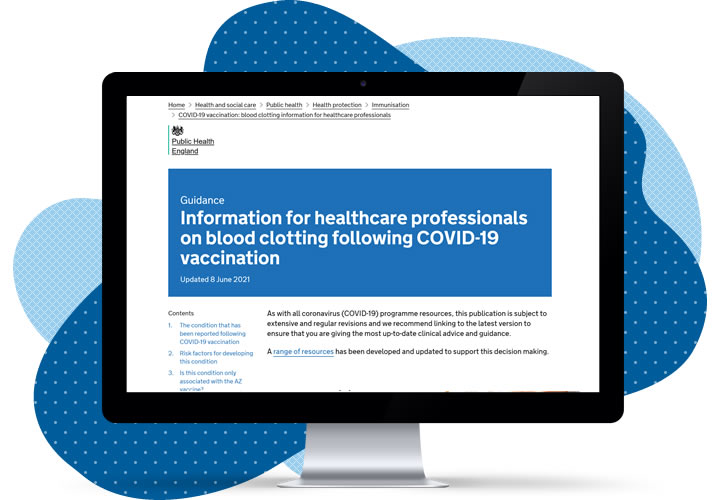
Information for HCPs on blood clotting following COVID-19 vaccination
Updated 8th May 2021
Since March 2021, there have been reports from the UK and internationally of an extremely rare condition characterised by thromboembolic events (blood clots) accompanied by thrombocytopenia (low platelets) following the first dose of the AstraZeneca (AZ) COVID-19 vaccination. This includes cerebral venous sinus thromboses (CVST) where blood clots develop in the cerebral veins occurring together with low platelet counts. These cases are particularly unusual because despite low platelets, there is progressive thrombosis (formation of blood clots which block blood vessels).
Read the Guidance
British living guidance on post - vaccine thrombosis & thrombocytopenia based on daily discussions between UK thrombosis experts & physicians caring for patients with this new syndrome
28th May 2021
V2.0: Guidance produced from the Expert Haematology Panel (EHP) focussed on syndrome of Thrombosis and Thrombocytopenia occurring after coronavirus Vaccination.
Endorsed by Thrombosis UK
Read the Guidance
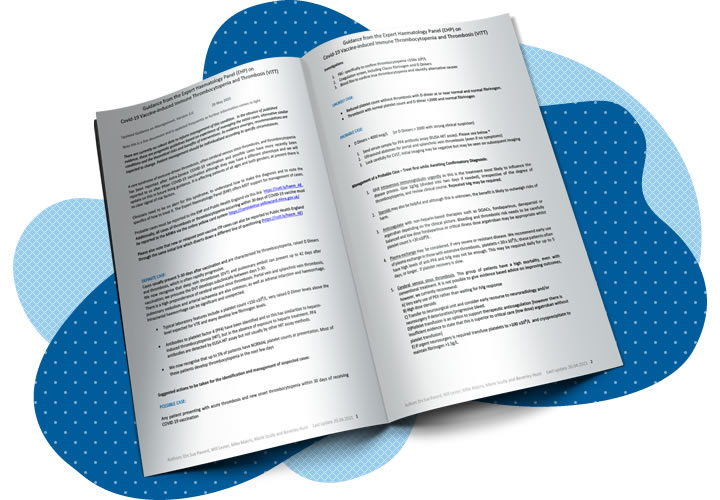

Message from the Medicines and Healthcare products Regulatory Agency (MHRA)
7th April 2021
Today (7th April 2021) MHRA issued new advice concluding there is a possible link between AstraZeneca COVID-19 Vaccine and extremely rare and unlikely to occur blood clots.
The benefits of vaccination continue to outweigh any risks but we are advising that careful consideration be given to people who are at higher risk of specific types of blood clots because of their medical condition.
The scientific review of UK reports of extremely rare and unlikely to occur specific blood clots with lowered platelets has concluded that the evidence of a link with COVID-19 Vaccine AstraZeneca is stronger but more work is still needed.
By 31 March, 20.2 million doses of the COVID-19 Vaccine AstraZeneca had been given in the UK meaning the overall risk of these blood clots is approximately 4 people in a million who receive the vaccine. We would advise that anyone who did not have these side effects should come forward for their second dose when invited.
The data suggest there is a slightly higher incidence reported in the younger adult age groups and we are advising that this evolving evidence should be taken into account when considering the use of the vaccine.
MHRA has issued updated guidance for healthcare professionals on how to minimise risks, as well as further advice on symptoms for vaccine recipients to look out for 4 or more days after vaccination.
See MHRA website for more information
JCVI statement on use of the AstraZeneca COVID-19 vaccine
7th April 2021
Since the start of the pandemic over 4 million COVID-19 infections have been confirmed in the UK causing more than 120,000 deaths. Over 30 million people have received their first dose of COVID-19 vaccine since the start of the programme, which Public Health England (PHE) estimate has prevented at least 6,000 deaths in the first 3 months of 2021. Analysis of infection data since the introduction of the COVID-19 vaccines in the UK demonstrates that vaccination is highly effective and substantially reduces the risk of infection and severe COVID-19 disease.
Read the Guidance
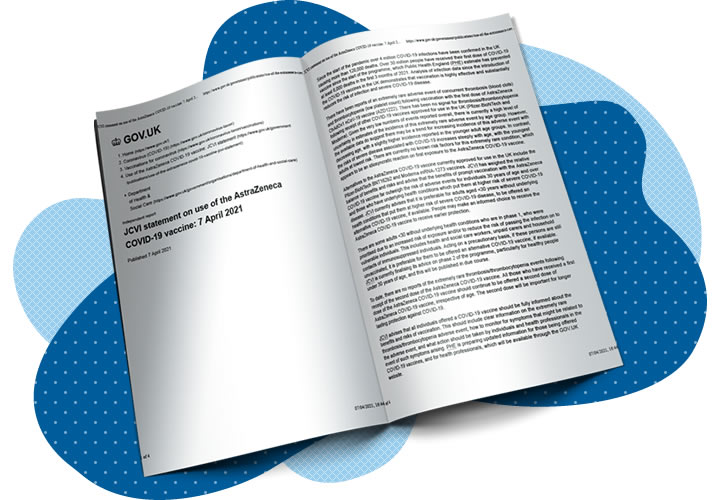
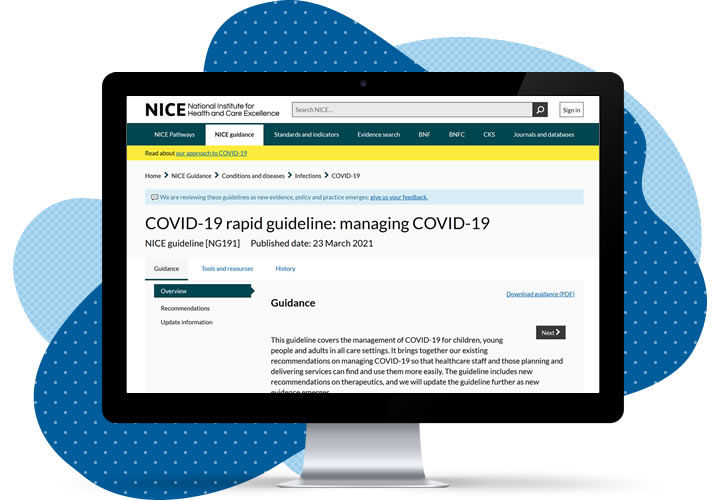
COVID-19 rapid guideline: managing COVID-19 - NICE guideline [NG191]
This guideline covers the management of COVID-19 for children, young people and adults in all care settings. It brings together our existing recommendations on managing COVID-19 so that healthcare staff and those planning and delivering services can find and use them more easily. The guideline includes new recommendations on therapeutics, and we will update the guideline further as new evidence emerges.
Read the Guidance
Update: AstraZeneca COVID vaccine
The Medicines Healthcare products Regulatory Agency (MHRA) issued findings from its most recent review of the AstraZeneca COVID vaccine.
Following a rigorous scientific review of all the available data the Medicines Healthcare products Regulatory Agency (MHRA) has confirmed:
- Available evidence does not suggest that blood clots in veins (venous thromboembolism) are caused by COVID-19 Vaccine AstraZeneca
- This follows a detailed review of reported cases as well as data from hospital admissions and GP records
- This has been confirmed by the Governments independent advisory group, the Commission on Human Medicines, whose expert scientists and clinicians have also reviewed the available data
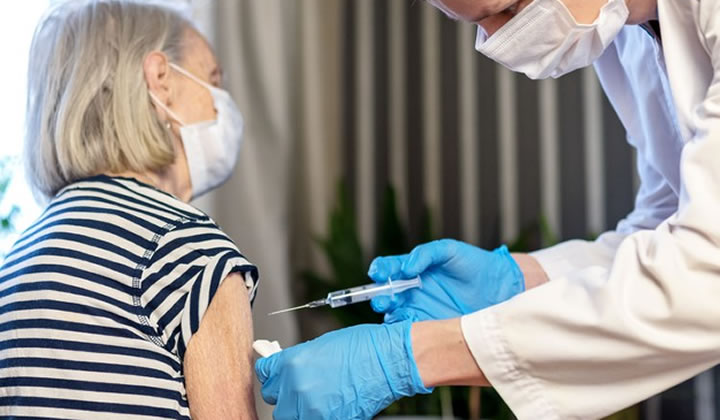
A further, detailed review into:
- Five UK reports of a very rare and specific type of blood clot in the cerebral veins (sinus vein thrombosis) occurring together with lowered platelets (thrombocytopenia) is ongoing
- This has been reported in less than 1 in a million people vaccinated so far in the UK and can also occur naturally – a causal association with the vaccine has not been established
- MHRA advice remains that the benefits of the vaccines against COVID-19 continue to outweigh any risks and that the public should continue to get their vaccine when invited to do so
Read full UK Medicines and Healthcare products Regulatory Agency (MHRA) update
World Health Organisation - COVID-19 Clinical Guidance
This document is the update of an interim guidance originally published under the title “Clinical management of COVID-19: interim guidance, 27 May 2020.
Read the Guidance
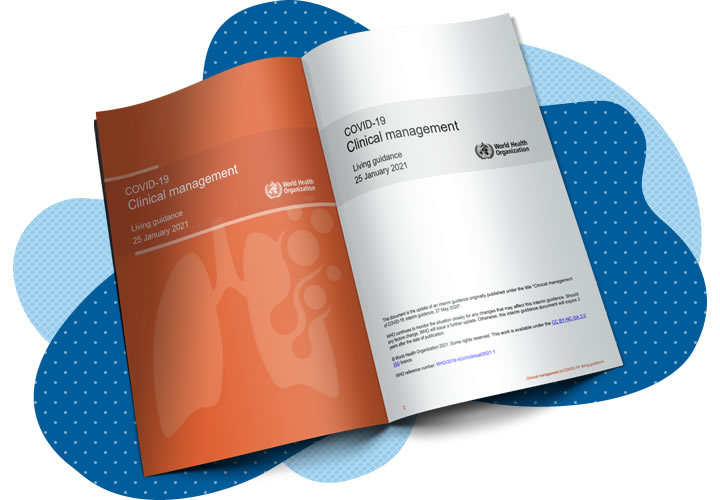
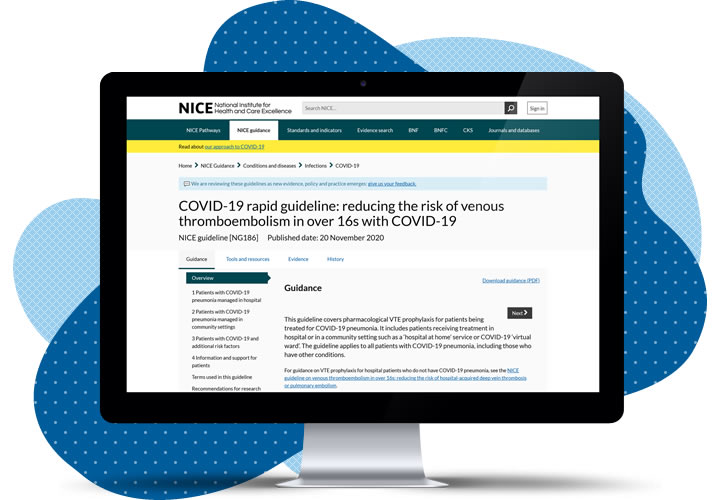
National Institute for Health & Care Excellence:
November 2020: COVID-19 rapid guideline: reducing the risk of venous thromboembolism in over 16s with COVID-19
Visit the Website
July 2020 – Thrombosis UK endorse ISTH multinational Consensus Statement calling on the World Health Organisation (WHO) to share learning and support a systematic approach for managing venous thromboembolism in patients with COVID-19
Download the Document
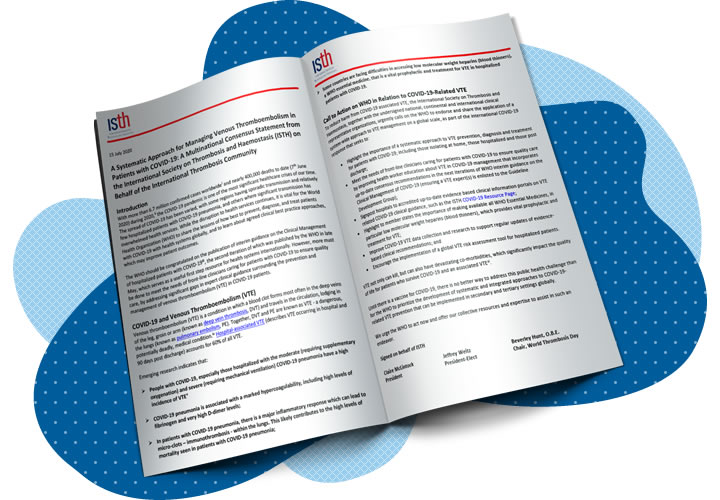
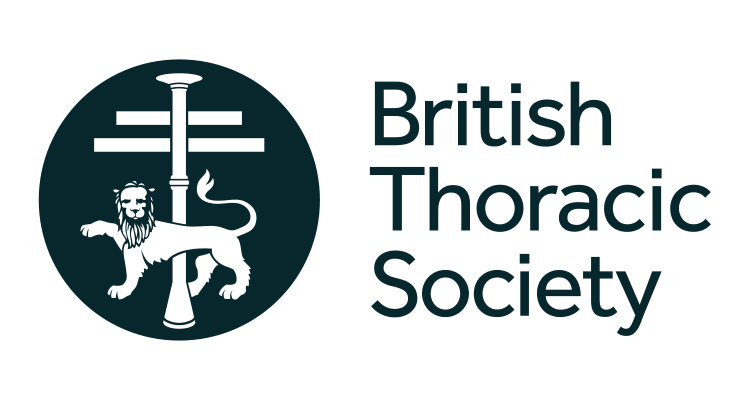
June 2020 – LATEST UPDATE: Clinical guide for prevention, detection and management of thromboembolic disease in patients with COVID-19
Download the Document

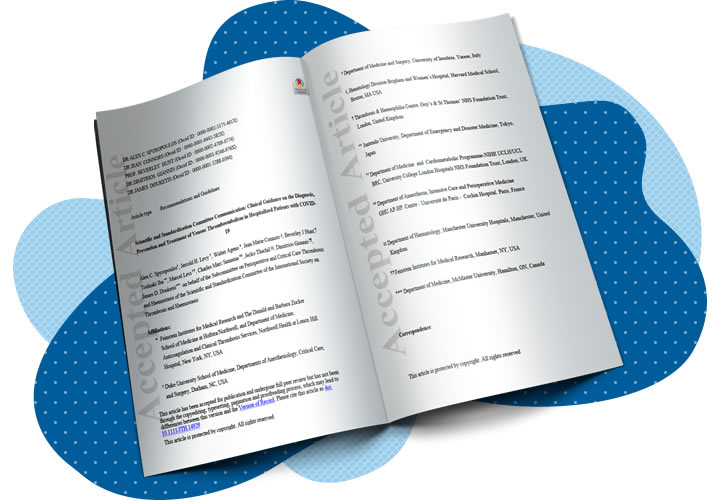
May 2020 – ISTH: Scientific and Standardization Committee Communication:
Clinical Guidance on the Diagnosis, Prevention and Treatment of Venous Thromboembolism in Hospitalized Patients with COVID-19
Download the Document
Prevention, diagnosis and treatment of venous thromboembolism in patients with COVID-19: CHEST Guideline and Expert Panel Report
CHEST Journal June 2020
June 2020 – Prevention, diagnosis and treatment of venous thromboembolism in patients with COVID-19: CHEST Guideline and Expert Panel Report
Download the Document
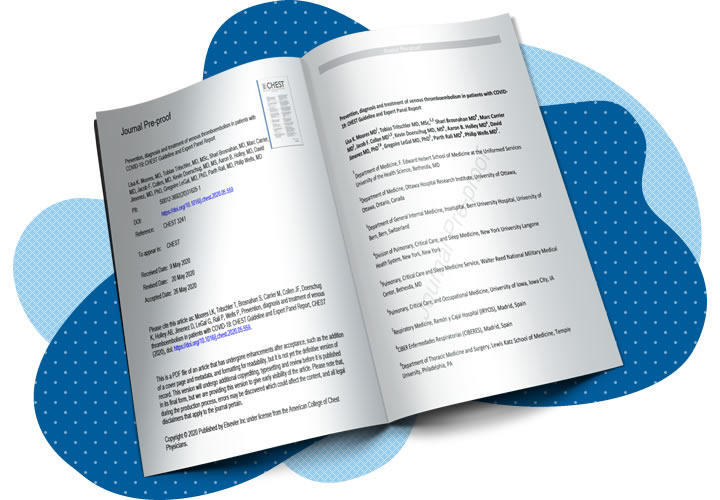
THE RISK OF THROMBOSIS IN LONG COVID
In this tutorial, Beverley outlines the risk of thrombosis in Long COVID, including what we know so far about thrombosis risk, seated immobility syndrome which does increase risk of blood clots, and what, if anything, does a D-dimer test tell us about someone’s risk of blood clots.
BLOOD CLOTS IN ACUTE COVID-19 INFECTION
In this tutorial, Beverley discussed blood clots in acute COVID-19 infection, including who is at risk, the types of thrombosis seen, and what preventative measures are recommended for moderately and severely unwell patients.
VACCINES AND BLOOD CLOTS
In this tutorial, Beverley introduces vaccine-induced immune thrombocytopenia and thrombosis syndrome, an extremely rare immune response to a vaccine causing thrombosis (blood clots) and thrombocytopenia (low platelet count), most commonly following the Astra-Zeneca vaccine.
COVID and PE
Chair:
Sylvia Teece-Round
Speaker:
Dr John Bright
COVID and clots
Chair:
Professor Beverley Hunt OBE
Speakers:
(a) Current thoughts on the pathogenesis of COVID-19 - Dr Yogen Kanthi
(b) Heparin as an anti-inflammatory and antiviral agent - Dr Andrew Webb
(c) Inhaled heparin – learning and research - Dr Quentin Nunes
Update on thromboprophylaxis and COVID
Chair:
Dr Mathew Fay
Speaker:
Update on thromboprophylaxis in hospitalised COVID-19 patients - Dr Dan Horner
Decision making on thromboprophylaxis for patients with COVID19 in the community (post discharge and those managed through a hospital at home mechanism) - Dr Susie Shapiro
Evidence update on Vaccine Induced Immune Thrombosis and Thrombocytopenia - Professor Beverley Hunt OBE
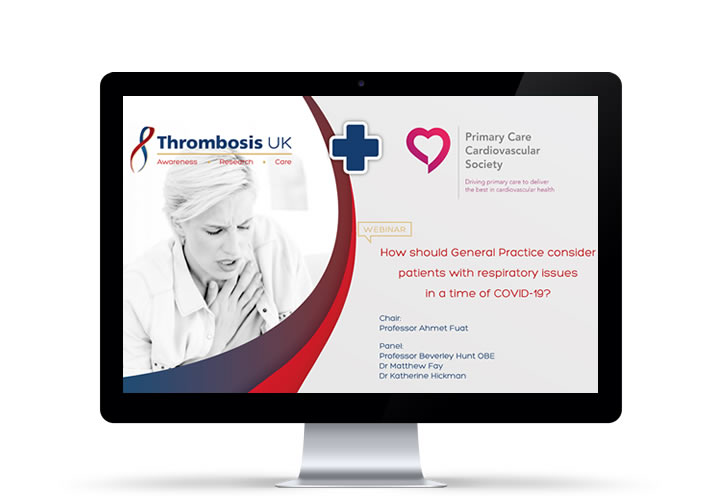
Watch the Webinar
Webinar: July 2020 How should General Practice consider patients with respiratory issues in a time of COVID-19?
Chair:
Professor Ahmet Fuat
Panel:
Professor Beverley Hunt OBE, Dr Matthew Fay, Dr Katherine Hickman
In the wake of COVID-19, primary care practitioners face new challenges in managing COVID-19 positive patients presenting with respiratory issues.
This webinar is a collaboration between Thrombosis UK, Primary Care Cardiovascular Society (PCCS) and will consider: What is the pathway and action for primary care managing acute but not hospitalised thrombosis and patients late presenting with respiratory symptoms?
Presentation and discussion will include:
- Guidance on investigating and managing respiratory issues in a patient when acutely unwell with COVID-19
- Considerations for the management of asymptomatic / mildly unwell COVID-19 positive patients with a previous history of thrombosis
- General management of respiratory issues during recovery from COVID-19
Webinar slides:
Prof B Hunt OBE: 'COVID-19 Natural History and Thrombotic Risk'
Webinar: July 2020 Problem areas in thromboprophylaxis and COVID-19
Chair:
Dr Daniel Horner
Panel:
Prof Beverley Hunt OBE, Dr Susie Shapiro
As the UK manages the COVID-19 pandemic, this webinar will consider the natural history of COVID-19 and COVID pneumonia and the evidence available to inform decision making in the role of:
- extended thromboprophylaxis following discharge from hospital for COVID-19,
- when managing unwell COVID-19 patients in the community and care homes and
- consideration when of COVID-19 positive patients who are at high risk of VTE.
Existing guidance, practice and emerging evidence will all be considered through presentations and discussion with opportunity to pose questions.
Watch the Webinar
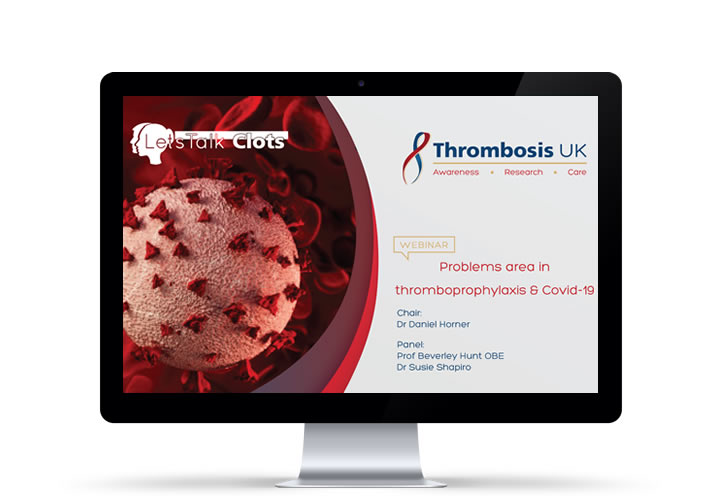
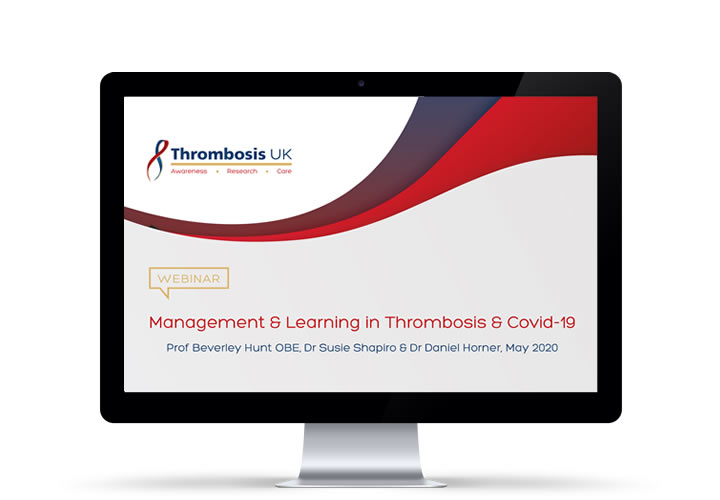
Webinar: May 2020 Management & Learning in Thrombosis & Covid-19
Presenters:
Prof Beverley Hunt OBE, Dr Susie Shapiro & Dr Daniel Horner
As the UK manages the Covid-19 pandemic, this webinar will discuss management of thrombotic risk, diagnosis and treatment in patients diagnosed with Covid-19. Existing guidance, recent local changes in practice and emerging evidence will all be considered through presentations, discussion and with opportunity to pose questions.
Watch the Webinar
Associated Assets
Read Dr Daniel Horner's blog 'Diagnosis & Treatment of VTE in the Covid-19 era' on St Emlyn's which supports his presentation in this webinar.
VTE Prevention and Covid-19
Dr Susie Shapiro
Consultant Haematologist, Oxford University Hospitals NHS Foundation Trust
Presented 19th May 2020
Diagnosis & Treatment of VTE in Covid-19
Dr Daniel Horner
Emergency & Critical Care Medicine
Presented 19th May 2020
Presentation Coming Soon
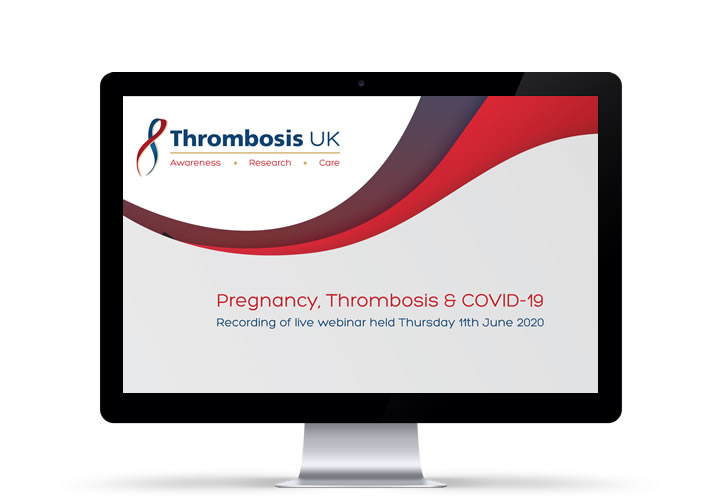
Webinar: June 2020 Pregnancy, Thrombosis & COVID-19
Recording of live webinar held Thursday 11th June 2020
The COVID-19 pandemic has challenged learning and management of thrombosis prevention and management in COVID-19 patients.
Three international experts – Drs Jan Daru (UK), Claire McLintock (New Zealand) & Saskia Middeldorp (Netherlands chaired by Prof Beverley Hunt OBE (UK), will review evidence and discuss management of thrombotic risk, diagnosis and treatment in pregnant women diagnosed with COVID-19.
Current guidance, practice and emerging global data will all be considered through presentation and discussion.
Watch the Webinar
Associated Assets
Dr Claire McLintock, SARS-CoV-2 COVID-19 & Pregnancy - Download Presenation
Prof S Middeldorp, Prevention of VTE in Pregnancy - Download Presenation
Dr Jan Daru, COVID-19 and Pregnancy, the RCOG response - Download Presenation
Webinar: 9th April 2020 Thrombosis, Thromboprophylaxis & Coagulopathy in COVID- 19 Infections
Presenters:
Professor Marcel Levi, University College Hospital
Prof. Levi will be discussing "Coagulopathy in COVID-19 Infections" during the webinar.
Professor Beverley Jane Hunt, King’s College London
Prof. Hunt will be discussing "Thrombosis and Anticoagulant Management in COVID-19 Infections"
Watch the Webinar
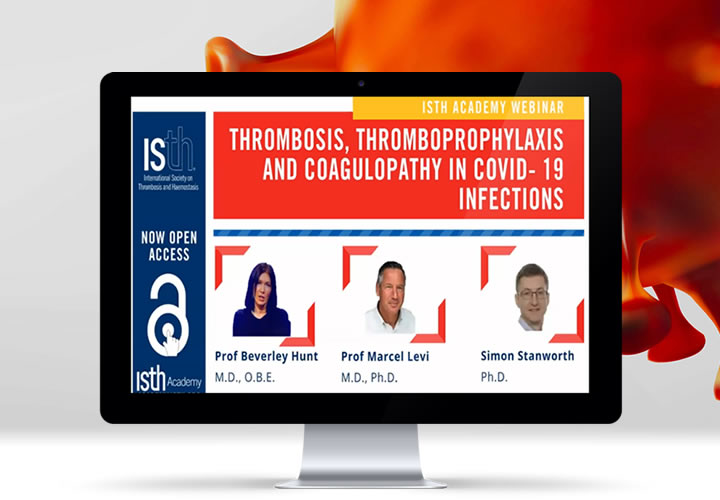
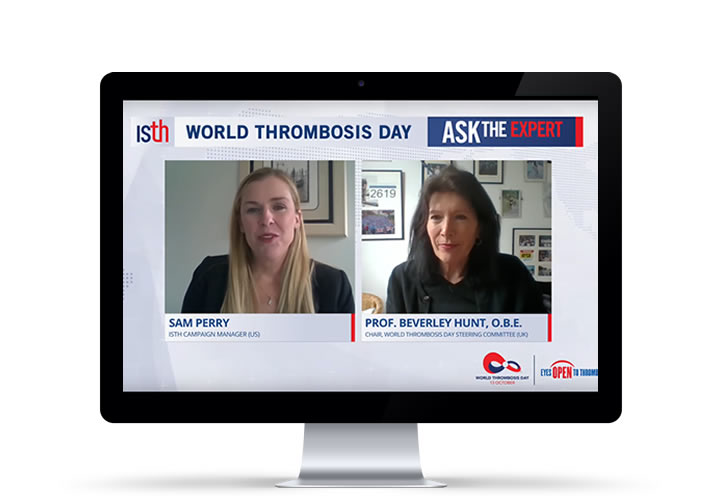
ISTH COVID-19 and Thrombosis June 2020 ‘Ask The Expert’ with Prof Beverley Hunt OB
Additional Information:
Join the World Thrombosis Day Team as we ask Beverley Hunt, M.D., O.B.E. some of the most common questions about thrombosis and COVID-19
Watch the Interview
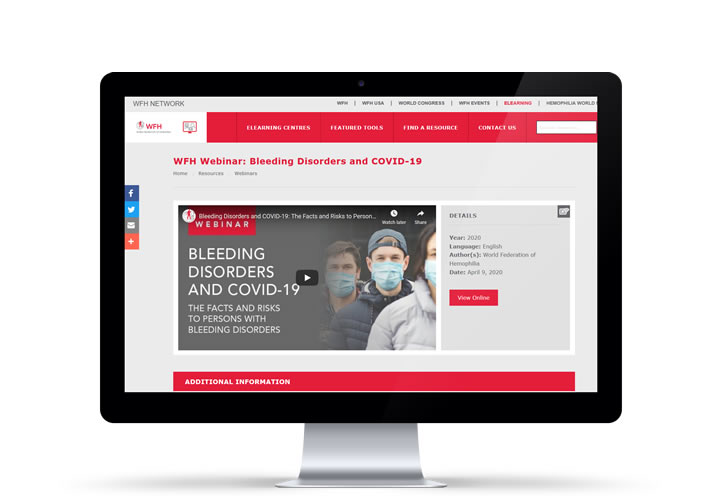
Webinar: 9th April 2020 Bleeding Disorders & Covid-19
Additional Information:
Listen as Glenn Pierce, MD, PhD (WFH VP Medical), Flora Peyvandi, MD, PhD, Magdy El Ekiaby, MD, Cedric Hermans, MD, PhD, and Radoslaw Kaczmarek, PhD, provide the global bleeding disorders community with up-to-date information on COVID-19. This 1-hour webinar, presented on April 9, 2020, also addressed participants’ questions and concerns.
Watch the Webinar
30th June 2021
Thrombosis UK has sent a letter to Dr June Raine CBE, CEO of MHRA, expressing our concern regarding wording in the MHRA guidance on the use of the AstraZeneca COVID-19 vaccine.
Read the Letter
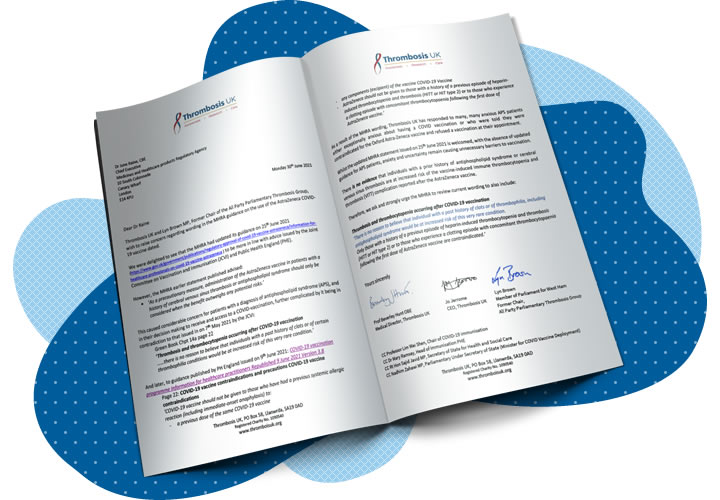

Letter from the Expert Haematology Panel and endorsed by Thrombosis UK, to the Medicines and Healthcare products Regulatory Agency (MHRA)
We wish to raise our concern with the MHRA regarding wording included in recent changes in MHRA guidance on the use of the AstraZeneca COVID-19 vaccine.
Read the Article
COVID-19 and Thrombosis in Cancer Patients: The Clot Thickens
Prof Alok Khorana looks at hypercoagulability of COVID-19 and strategies and recommendations for anticoagulation.
Read the Article
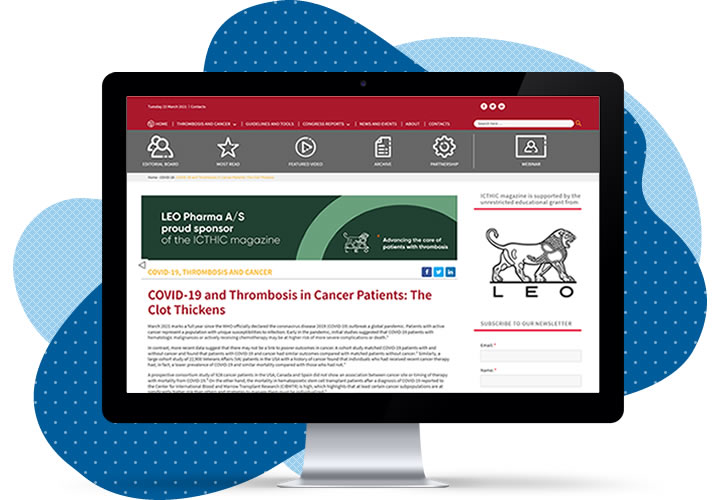
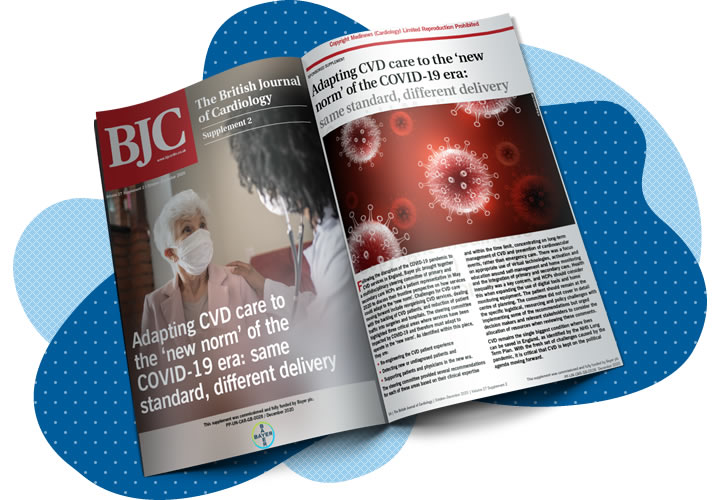
Adapting CVD care to the ‘new norm’ of theCOVID-19 era: Same standard, different delivery
BMJ December 2020
The past year has been challenging for all of us in the NHS.
When looking at the impact of the pandemic on the field of cardiovascular disease (CVD), reduced screening opportunities and cancelled clinics and procedures have caused widespread disruption.
However, there is a positive side. The pandemic has provided a unique opportunity for restructuring CVD services in England. Telemedicine, home monitoring and integration of primary and secondary care are not new concepts in CVD care, yet their increased use over the recent months has served us and our patients well. In fact, the increased uptake of these systems and processes during lockdown have been effective, more convenient and appropriate for the digitally connected age in which we live.
Read the Article
TRIAL RESEARCH UPDATE
Three clinical trial platforms working together to test the effects of anticoagulants in people with COVID-19 have paused enrolment of critically ill hospitalised patients.
Among critically ill COVID-19 patients requiring intensive care unit (ICU) support, full doses of anticoagulation drugs did not improve outcomes. The trials are continuing to enrol moderately ill hospitalised COVID-19 patients.
Three international partners have come together in an unprecedented collaboration resulting in a multiple platform randomised controlled trial. The partners include REMAP-CAP - the Randomised, Embedded, Multi-factorial Adaptive Platform Trial for Community-Acquired Pneumonia. REMAP-CAP is a nationally prioritised COVID-19 study, and as of November 2020 75% of all study participants had been recruited in the UK through the NIHR’s Clinical Research Network (CRN).
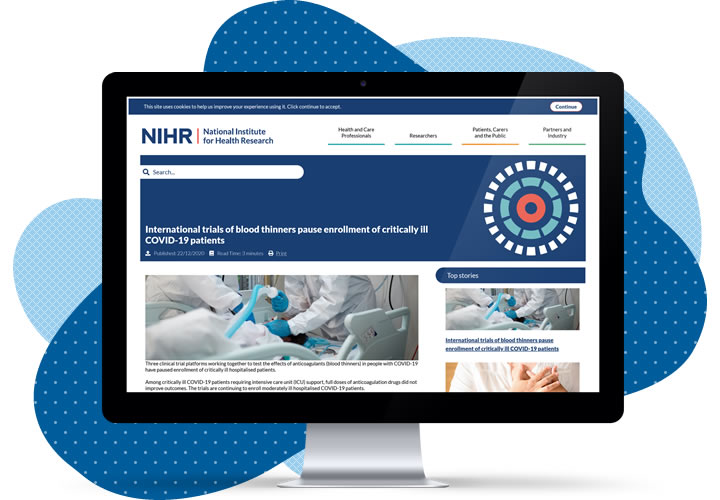
The other partners are Accelerating COVID-19 Therapeutic Interventions and Vaccines-4 (ACTIV-4) and Antithrombotics Inpatient and Antithrombotic Therapy to Ameliorate Complications of COVID-19 (ATTACC).
The three trials, which span four continents, have the common goal of assessing the benefit of full doses of blood thinners to treat moderately ill or critically ill adults hospitalised for COVID-19, compared with a lower dose often used to prevent blood clots in hospitalised patients.
As is normal for clinical trials, these trials are overseen by independent boards that routinely review the data and are composed of experts in ethics, biostatistics, clinical trials, and blood clotting disorders.
Informed by the deliberations of these oversight boards, all of the trial sites have paused enrolment of the most critically ill hospitalised patients with COVID-19. The researchers could not exclude potential for harm in this sub-group, and increased bleeding was noted with full-dose anticoagulation. The trials are working urgently to undertake additional analyses, which will be made available as soon as possible. It should be noted that patients who had another reason to take full-dose blood thinners were not included in the trials.
At the recommendation of the oversight boards, patients who do not require ICU care at the time of enrolment will continue to be enrolled in the trial. Whether the use of full-dose compared with low-dose blood thinners leads to better outcomes in hospitalised patients with less severe disease remains a very important question.
REMAP-CAP continues to evaluate multiple other study questions, including therapeutic anticoagulation, antiplatelets, apremilast, eritoran, anakinra, sarilumab, vitamin C, simvastatin, convalescent plasma, macrolides and antibiotics.
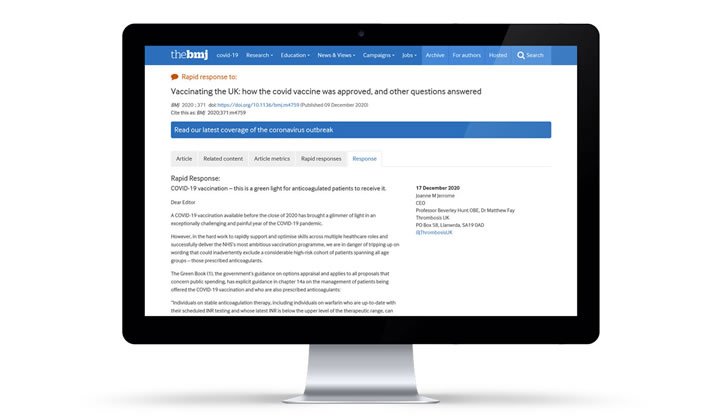
COVID-19 vaccination – this is a green light for anticoagulated patients to receive it
Letter published on BMJ 17 Dec 2020
Prof Beverley hunt, Dr Matthew Fay, Jo Jerrome
Read the Letter
Pulmonary embolism in hospitalised patients with COVID-19
Martin B. Whyte, Philip A. Kelly, Elisa Gonzalez, Roopen Arya, Lara N. Roberts, June 2020
Read the Article
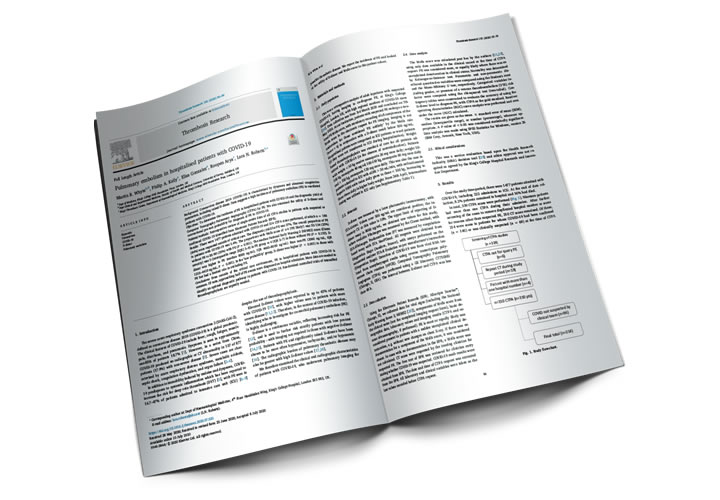
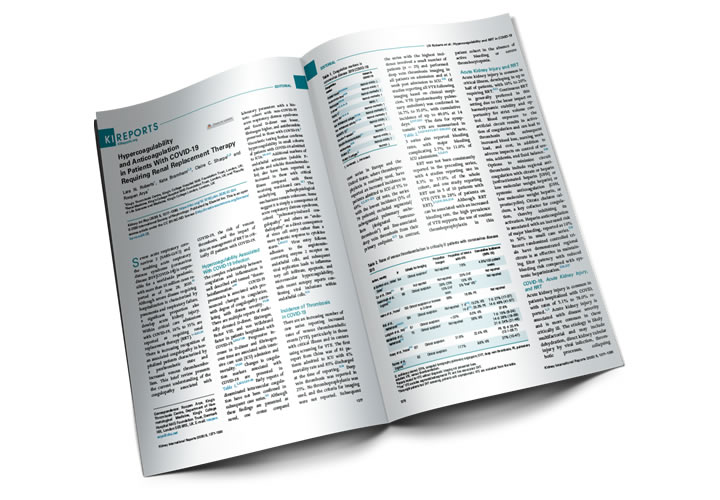
Hypercoagulability and Anticoagulation in Patients With COVID-19 Requiring Renal Replacement Therapy
Lara N. Roberts, Kate Bramham, Claire C. Sharpe and Roopen Arya, June 2020
Read the Article
VTE and COVID-19, Would You Like to Know More?
Blog by D Horner, Oct 2020 following presentation at the Let’s Talk Clots 2020 conference.
Read the Blog
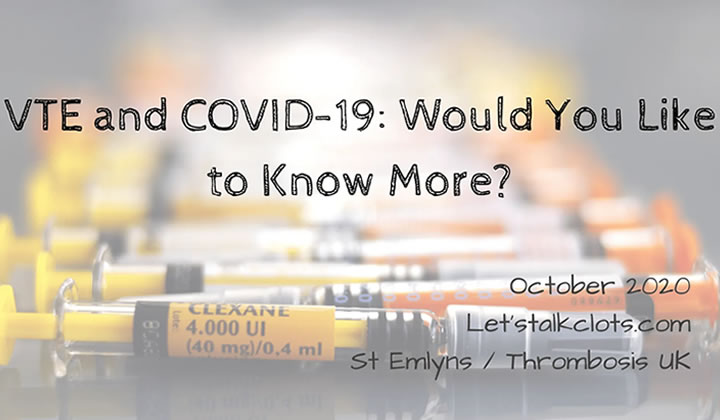
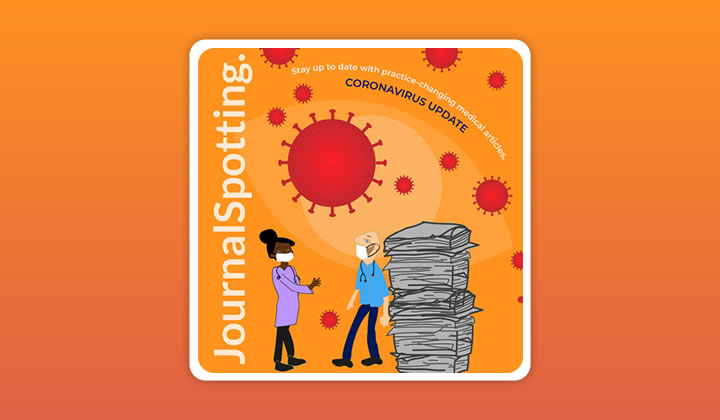
Journal Spotting Podcast: #14 JournalChat// Bloody COVID, with Thrombosis Expert Prof Beverley Hunt
Listen to this podcast via Spotify and Apple Podcast or visit the website: www.JournalSpotting.com to view other available platforms.
You can also see view the associated animation by clicking here.
NEWS: Coronavirus, ‘baffling’ observations from the front line
When you talk to intensive care doctors across the UK, exhausted after weeks of dealing with the ravages of Covid-19, the phrase that emerges time after time is, "We've never seen anything like this before."
Read the Article


NEWS: Covid-19 and thrombosis: what do we know about the risks and treatment?
Prof Hunt OBE, Medical Director for Thrombosis UK, discusses the high rates of blood clots being seen in patients who are seriously ill with covid-19, and the urgent need for the delayed clinical guidance on thrombosis and critical care for patients with Covid-19, to be published.
Read the Article
NEWS: COVID-19: Anticoagulation Recommended Even After Discharge
Guidance from consensus group and others details on use across settings
Of COVID-19's hallmark symptoms, clotting may not rank high in the national consciousness. But it has made quite an impression in-hospital. "I have never, ever, ever seen such high levels of D-dimer in any of the hundreds of other patients with venous thrombosis that I've seen over the past 15 years," said Behnood Bikdeli, MD, of NewYork-Presbyterian Hospital/Columbia University Irving Medical Center in New York City. "It's just mind-blowing."
Read the Article



